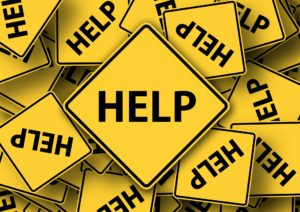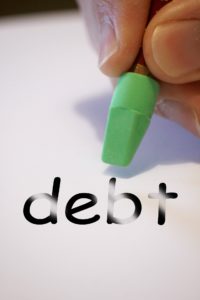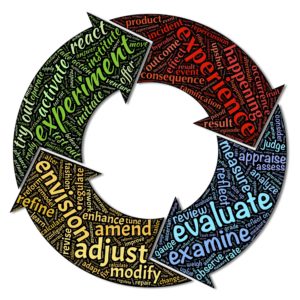Most people are caught up in accepting debt as a way of life. A lot of people buy things they cannot afford on credit and spend money that they haven’t earned yet. Some people buy more house than they can afford and drive cars that they can barely maintain. This can go on for only so long because before they know it, they are stuck in a debt cycle that they may never get out of because they are living paycheck to paycheck. But this life is not set in stone. All it takes is courage, commitment, insight, self-discipline and awareness to realize that you need to make a decision to step out of this standard living pattern that is so deeply ingrained as unhealthy beliefs and poor financial habits and take action to replace them with good financial habits and healthy financial beliefs. Unfortunately, these are the things that people avoid doing so it holds them back from realizing their highest potential. But if you are tired of trying to make ends meet and tired of coming up short every month and are ready, you can change the game in your favor. Today, is the day that you should forgive yourself of your past financial decisions and behaviors so you can create the financial future you deserve. So, I encourage you to make the commitment to do whatever it takes to take control of your finances. And then, the very first thing you need to do to get this journey started is determine your current financial situation. Take the time to sit down and assess your current financial status.
You can take a snapshot picture of your financial situation by using a Personal Cashflow Statement. The Personal Cashflow Statement allows you to calculate your Net Total Cashflow. It will tell you if you are operating with a positive or a negative cashflow. If your Net Total Cashflow is positive, you will have a surplus of money leftover and you will be able to use that money to save, invest and build wealth. If your Net Total Cashflow is negative you are operating at a loss. Therefore, you are probably using credit to cover the difference and are falling deeper and deeper into debt. Either way, you need this snapshot picture to know where you are financially. This quick peek into your cashflow will make you aware of where you are. Whatever your personal financial situation, I want you to know that you have the power to change it. You have the power to improve it and make it better. If you implement the 7 Rules mentioned in this article – it can become a financial game changer for you. But it is all up to you!
You have to decide if you want to change the financial game that you are playing so that it works in your favor or do you want to keep doing what you have always done and hope that it turns out in your favor some day? See, if you are satisfied with your financial life, you don’t need to read any further. But if you are tired of being held back financially keep reading because I wrote this article just for you. It is for the people who are looking for 7 Rules to Improving Personal Finances.
Rule No. 1: Develop a Monthly Spending Plan
A Monthly Spending Plan allows you to plan how you are going to spend your money.
 It is your strategy for where you want to spend the money that you receive. It is developed based on actual knowledge of how you are spending your money. To initiate this process, you would track all your expenses for at least 30 days. I recommend getting a small notebook and tracking every time you spend money. Nothing is too small! Sometimes people use the word budget interchangeably with Spending Plan but I do not because they are very different. The word “budget” makes most people run because they see them as very restrictive. Just as most people hate to hear the word “diet.” A budget is usually based on estimates where as a Spending Plan is developed after assessing your actual expenses and how you are currently spending your money. A Spending Plan is flexible whereas most people see budgets as cut in stone. I love Spending Plans because you decide how you want to spend your money before you actually spend money. You decide how much you want to save before you spend money. You feel more in control with a Spending Plan because if you need to spending more in one area you just lower your expenditures in another area. You control the scenario because you are quite aware of how your money is flowing and where it is flowing too.
It is your strategy for where you want to spend the money that you receive. It is developed based on actual knowledge of how you are spending your money. To initiate this process, you would track all your expenses for at least 30 days. I recommend getting a small notebook and tracking every time you spend money. Nothing is too small! Sometimes people use the word budget interchangeably with Spending Plan but I do not because they are very different. The word “budget” makes most people run because they see them as very restrictive. Just as most people hate to hear the word “diet.” A budget is usually based on estimates where as a Spending Plan is developed after assessing your actual expenses and how you are currently spending your money. A Spending Plan is flexible whereas most people see budgets as cut in stone. I love Spending Plans because you decide how you want to spend your money before you actually spend money. You decide how much you want to save before you spend money. You feel more in control with a Spending Plan because if you need to spending more in one area you just lower your expenditures in another area. You control the scenario because you are quite aware of how your money is flowing and where it is flowing too.
Rule No 2: Pay Yourself First
Paying yourself first means that you make sure that you are at the head of the line when you spend the money that you earn. Quite often, people say that they want to save money for a rainy day, retirement or investments but they put it at the bottom of their list. They will put money in those areas if they have money left. The problem is that this process never works. The end of the month comes and there is never any money left over to save and invest for your future. This rule is a really big game changer because if you adjust your behavior in this area, you can change your financial trajectory.  Of course, the question you may be asking is … how much money should I put aside? If you can I would recommend at least 10% to start and then increase it as you are able. If that’s not possible try to put 5%. And if that is not possible put away something. You have to start somewhere. The goal is to develop the habit of putting yourself first by paying yourself first. Just remember that bad habits that have been learned can be unlearned. It is up to you to take a step in this direction no matter how small. Then do this action repeatedly over time until you have established this as a new habit.
Of course, the question you may be asking is … how much money should I put aside? If you can I would recommend at least 10% to start and then increase it as you are able. If that’s not possible try to put 5%. And if that is not possible put away something. You have to start somewhere. The goal is to develop the habit of putting yourself first by paying yourself first. Just remember that bad habits that have been learned can be unlearned. It is up to you to take a step in this direction no matter how small. Then do this action repeatedly over time until you have established this as a new habit.
Rule No. 3: Build Your Emergency Fund
The Emergency Fund is just that…a fund that you setup to be prepared for unexpected emergencies. Let’s define an emergency because many people have changed the definition. Merriam-Webster defines emergency as 1. an unforeseen combination of circumstances or the resulting state that calls for immediate action. and  2. an urgent need for assistance or relief. An emergency could be losing your job or your car breaking down or the furnace, air conditioner or water tank going out. An emergency is not buying a new pair of shoes, a dress or going out to eat. When you deposit money in an emergency fund you do not take it out unless there is a true emergency. There are several schools of thought on how much you should have in an Emergency Fund. Basically, you should strive to at least have enough in your emergency fund to cover all your monthly expenses for at least six (6) months to a year. But the key is to get started putting money away right away. Start out to save $1,000 at first and then keep adding to your Emergency Fund. If an emergency should arise what ever amount you have saved will be able to help with the costs but if you don’t have anything in your Emergency Savings Fund you will be looking to credit to get you out of the emergency that you are facing. As mentioned in rule number two, you should put money in your Emergency Fund at the same time you pay yourself first even if you use some of the money that you pay yourself first to fund your Emergency Fund.
2. an urgent need for assistance or relief. An emergency could be losing your job or your car breaking down or the furnace, air conditioner or water tank going out. An emergency is not buying a new pair of shoes, a dress or going out to eat. When you deposit money in an emergency fund you do not take it out unless there is a true emergency. There are several schools of thought on how much you should have in an Emergency Fund. Basically, you should strive to at least have enough in your emergency fund to cover all your monthly expenses for at least six (6) months to a year. But the key is to get started putting money away right away. Start out to save $1,000 at first and then keep adding to your Emergency Fund. If an emergency should arise what ever amount you have saved will be able to help with the costs but if you don’t have anything in your Emergency Savings Fund you will be looking to credit to get you out of the emergency that you are facing. As mentioned in rule number two, you should put money in your Emergency Fund at the same time you pay yourself first even if you use some of the money that you pay yourself first to fund your Emergency Fund.
Rule No. 4: Spend Less Than You Earn
This is a golden rule! When you Spend Less Than You Earn you will have opened the door to having a surplus of money left at the end of each month. You are putting yourself in a position where you now have the ability to save and invest for your future.  By tapping into this golden rule, you will be able to build wealth. The goal should always be to accumulate assets and not liabilities but that is not the norm for most people. Most people follow the norm…they constantly use credit to buy things that they cannot afford. Every time you use your credit card or take out a loan you are creating debt and debt is a liability. When you purchase a car on credit you’ve created a liability. Even the house that you are living in. If it was bought with a mortgage, it is a liability. Some people would like you to believe that it is an asset. But it is not an asset. It is a liability until it is paid in full. It is a fact that so many people are caught up in creating liabilities instead of obtaining assets. I highly recommend that you Spend Less Than You Earn so you can build wealth and have a surplus of funds to cover the things that you need rather than using debt. See debt enslaves you and keeps you owing others. It keeps you spending money that you haven’t even earned yet. But when you Spend Less Than You Earn and continue to have a surplus of money left over, you will soon experience this freedom that will change your spending habits. Will it take work? Absolutely yes! But I promise you it is so much more satisfying than worrying how you’re going to make ends meet at the end of the month.
By tapping into this golden rule, you will be able to build wealth. The goal should always be to accumulate assets and not liabilities but that is not the norm for most people. Most people follow the norm…they constantly use credit to buy things that they cannot afford. Every time you use your credit card or take out a loan you are creating debt and debt is a liability. When you purchase a car on credit you’ve created a liability. Even the house that you are living in. If it was bought with a mortgage, it is a liability. Some people would like you to believe that it is an asset. But it is not an asset. It is a liability until it is paid in full. It is a fact that so many people are caught up in creating liabilities instead of obtaining assets. I highly recommend that you Spend Less Than You Earn so you can build wealth and have a surplus of funds to cover the things that you need rather than using debt. See debt enslaves you and keeps you owing others. It keeps you spending money that you haven’t even earned yet. But when you Spend Less Than You Earn and continue to have a surplus of money left over, you will soon experience this freedom that will change your spending habits. Will it take work? Absolutely yes! But I promise you it is so much more satisfying than worrying how you’re going to make ends meet at the end of the month.
Rule No. 5: Reduce or Eliminate Your Debt
 In order to get the full benefit of improving your personal finances, you need to reduce or eliminate your debt. The more money you can move from debts to a surplus of money that is available to save and invest, the more advantages you will have to build wealth like never before. I promise you debt is not your friend. You may think that getting credit is an advantage but it is not. You are selling your future earnings to creditors who are profiting from your desire to have things now (instant gratification) rather than save and invest in your future and obtain the things you would love to have later (delayed gratification). Debt happens to be the enemy and when you come to that realization no one can cause you to operate in a way that doesn’t benefit you.
In order to get the full benefit of improving your personal finances, you need to reduce or eliminate your debt. The more money you can move from debts to a surplus of money that is available to save and invest, the more advantages you will have to build wealth like never before. I promise you debt is not your friend. You may think that getting credit is an advantage but it is not. You are selling your future earnings to creditors who are profiting from your desire to have things now (instant gratification) rather than save and invest in your future and obtain the things you would love to have later (delayed gratification). Debt happens to be the enemy and when you come to that realization no one can cause you to operate in a way that doesn’t benefit you.
Rule No. 6: Monitor and Track Your Expenses
 It is very important to always know what is going on with your money. Never take your hands off the reigns. The more you know about your money, the more you can grow your money. Most people just want to live and spend without taking the time to know what’s happening with their money. If you really want to improve your personal finances, you have to be willing to do the things you don’t want to do so you can live the life that you really want to live. Most people dream of being rich or living a prosperous life style but they are not willing to learn what it takes to make those dreams come true. The answer is not getting more money. If you had more money and you still operated under the same poor financial habits and limiting beliefs, pretty soon you would find yourself in the same position if not in a worse position. If you are not managing what you have right now, well, you won’t magically start managing millions of dollars any better. Sure, you could hire accountants and attorneys but if you are not financially educated and you don’t have the right money mindset and financial behavior, you’ll still miss out on what you could have done. You will not reach your highest potential. Most people miss this rule! You are the one who needs to change your financial identity and habits so that you can improve your personal finances and live your best life.
It is very important to always know what is going on with your money. Never take your hands off the reigns. The more you know about your money, the more you can grow your money. Most people just want to live and spend without taking the time to know what’s happening with their money. If you really want to improve your personal finances, you have to be willing to do the things you don’t want to do so you can live the life that you really want to live. Most people dream of being rich or living a prosperous life style but they are not willing to learn what it takes to make those dreams come true. The answer is not getting more money. If you had more money and you still operated under the same poor financial habits and limiting beliefs, pretty soon you would find yourself in the same position if not in a worse position. If you are not managing what you have right now, well, you won’t magically start managing millions of dollars any better. Sure, you could hire accountants and attorneys but if you are not financially educated and you don’t have the right money mindset and financial behavior, you’ll still miss out on what you could have done. You will not reach your highest potential. Most people miss this rule! You are the one who needs to change your financial identity and habits so that you can improve your personal finances and live your best life.
Rule No. 7: Plan for Your Financial Future
 No matter who you are, one day you will need to take pause because you can’t work anymore. When you get to your golden years, you want to make sure that you have sufficiently planned financially in a way that allows you to live in a lifestyle that you see for yourself. This requires you to save and invest for your retirement years. The sooner you start the better! Saving and investing for those retirement years could be in 401(k), IRAs, pensions, stocks, bonds, etc. You just want to make sure that you are putting money aside to be invested for your retirement years. At some point you want to hire a professional financial planner who will help you meet your financial goals for retirement.
No matter who you are, one day you will need to take pause because you can’t work anymore. When you get to your golden years, you want to make sure that you have sufficiently planned financially in a way that allows you to live in a lifestyle that you see for yourself. This requires you to save and invest for your retirement years. The sooner you start the better! Saving and investing for those retirement years could be in 401(k), IRAs, pensions, stocks, bonds, etc. You just want to make sure that you are putting money aside to be invested for your retirement years. At some point you want to hire a professional financial planner who will help you meet your financial goals for retirement.
I hope this article was helpful to you. If you need further assistance and would like to connect with me to see how I can help you improve your personal finances, please schedule a FREE 15 minute complimentary session with me by Clicking Here.